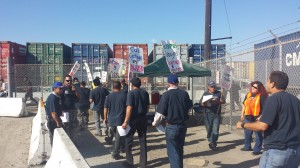In California, hundreds of thousands of workers receive less than minimum wage, or don’t get paid for overtime, or don’t get breaks they are due by law. In order to expose some of those responsible to public shame, a wide labor coalition just published a list of a dozen companies that consistently commit this kind of violation and, when ordered to pay, avoid their responsibility. The coalition says together, these companies show the wide variety of industries that commit this kind of labor law violation, and the broken system set up to protect workers. Our correspondent in Los Angeles, Rubén Tapia, has the story.
A group of workers protests outside the California Cartage Company, a transportation and storage company that has been in business for more than 70 years and has warehouses in the U.S. and Mexico.
“We have a big problem,” says Rafael Quinteros, in Spanish. Quinteros joined the protest after he got off work. “They’ve been stealing from us since who knows when, and we didn’t even realize.”
Quinteros drives a fork lift for the company, which does business with the city of Los Angeles. Eighteen years ago, the city approved an ordinance that companies that do business with the city have to pay their workers two to three dollars more than minimum wage. Quinteros hasn’t received this additional money in the 20 years he has worked with the company.
“I should have made a lot more, but they didn’t give me anything,” he says.
With his current salary of $10.50 an hour, Quinteros says he can barely support his family. He has a 17-year-old son and a wife who is sick and cannot work.
“With what I make here, I have to buy very little. I don’t even have enough to buy my wife’s medicine sometimes,” Quinteros says.
That’s why he joined a class-action lawsuit against California Cartage Company, calling on it to comply with the Los Angeles ordinance. The suit was filed in December, and a hearing will be held in October.
California Cartage Company is one of 12 businesses listed as consistently violating labor laws, in a new report. The company did not respond to a request for an interview with Radio Bilingüe.
“[Wage theft] doesn’t only happen in some industries in our economy, it happens in big companies and small companies, even mom-and-pop businesses,” says Lucero Herrera, a researcher with the UCLA Labor Center, which systematized the report, by a wide coalition of more than 30 community and labor organizations. One of the goals of the report is to expose the tactics used by companies to avoid having to comply with the law.
“Many of these corporations do business with contractors or subcontractors that they know are breaking the law. It also illustrates that there are a lot of loopholes in the laws and unscrupulous individuals take advantage of that. They can declare bankruptcy and keep operating the same business and nothing happens, and many companies just don’t pay,” Herrera says.
The study is titled “The Dirty Dozen: Snapshots of Wage Theft in California.”
“[These twelve] are the companies that we had the most information about and also they show what happens in different geographic regions and different industries: in the garment industry, carwash, transportation, security, manufacturing, housecleaning, child care and long-term adult care,” says Herrera.
The companies exposed in this report hae been fined for wage theft, or are being sued or confront charges for other violations of labor laws. The twelve are California Cartage Company, Bayview Care Home, Property Services, Coast to Coast West, Inc., GMS, North Coast Couriers, Scientific Concepts, Century Car Wash, XPO Logistics, the restaurant Crazy Buffet, supermarket chain El Super, and HCGS/ HSG Healthcare Services Group.
According to the report, the California Labor Commissioner has issued 16 judgments against this last company for unpaid wages. The company has 45,000 workers and annual revenue of nearly one and a half billion dollars. Its central offices are located in Pennsylvania and it is present in 48 states, including California.
The company hired Matilde Valenzuela through a subcontractor. In one of its clinics in Fontana, California, Valenzuela workers were not paid for obligatory meal and rest breaks.
“We would eat something fast, or standing up, while we worked, and then we would go back and punch in,” she explains.
Since Valenzuela didn’t know the law, she thought that ws normal and didn’t protest for more than a year.
“It was just routine, that’s how the rules were, that’s what we thought,” she says.
However, five years ago, the eight workers of the “Laurel” clinic filed a wage theft claim and were able to get their backwages.
“They paid me 400 dollars, and others got 500 dollars, according to the years they worked,” says Valenzuela.
After winning, the workers unionized and Valenzuela testified this year in the California Senate against wage theft.

Matilde Valenzuela is one of relatively few workers in California who are able to actually recover their stolen wages. Photo: Rubén Tapia.
“If you don’t speak up, people abuse you and they keep abusing other people who come,” says Valenzuela.
These twelve companies are just the tip of the iceberg. They may only be the most visible because many have been taken to court. The problem of wage theft is much bigger.
The groups belonging to the California Fair Paycheck Coalition, which published the report The Dirty Dozen, have hopes that the bill SB 588, which passed the State Senate and is currently in the Assembly, will establish effective means to protect workers from these crimes.
By Rubén Tapia
















